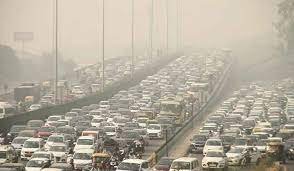
In response to the escalating air quality crisis in the national capital, the Delhi government has announced the postponement of the odd-even traffic restriction scheme. The decision came shortly after the Supreme Court questioned the effectiveness of the initiative and left the final call on its implementation to the ruling Aam Aadmi Party (AAP).
The odd-even scheme, designed to restrict privately-owned car traffic based on registration numbers, was initially scheduled to be enforced from the day after Diwali, starting November 13. However, the Supreme Court, expressing skepticism about the scheme’s impact, labeled it as “optics” and demanded evidence of its success, citing the annual deterioration of air quality in the city.
Environment Minister Gopal Rai, addressing the media on Friday, stated that the Delhi government would reconsider the implementation of the odd-even scheme after conducting a thorough review of the air quality post-Diwali. Rai noted a slight improvement, with the Air Quality Index (AQI) dropping from over 450 to around 300. The minister emphasized the need for a significant improvement in pollution levels before considering the implementation of the traffic restriction measures.
During the Supreme Court hearing, a report was presented indicating that the odd-even scheme led to a 13 percent reduction in vehicular pollution and a corresponding decrease in daily kilometers traveled, estimated at 37.8 lakh during the scheme’s enforcement. The court, however, pointed out that vehicular pollution constitutes only 17 percent of the larger pollution problem, raising doubts about the scheme’s overall impact.
Of significance is the fact that the odd-even rules apply only to private four-wheelers, exempting two-wheelers and taxis, which collectively account for a substantial portion of Delhi’s registered vehicles.
Delhi woke up to overnight rains that provided temporary relief, causing a drop in AQI from nearly 500 to 407 at 7 am. The court, while acknowledging the improved air quality, emphasized that it was not a result of government efforts but rather a natural occurrence. Justice SK Kaul questioned the government’s approach to addressing pollution, particularly in the context of farm fires in Punjab.
As Delhi grapples with a week of hazardous pollution levels, ranking as the world’s most polluted city until Thursday, the Supreme Court has urged the concerned authorities to adopt comprehensive measures to combat the broader environmental challenges. The court’s message is clear: while weather changes occur annually, substantial and sustained efforts are required to tackle the persistent air quality issues plaguing the city.
Sources By Agencies

